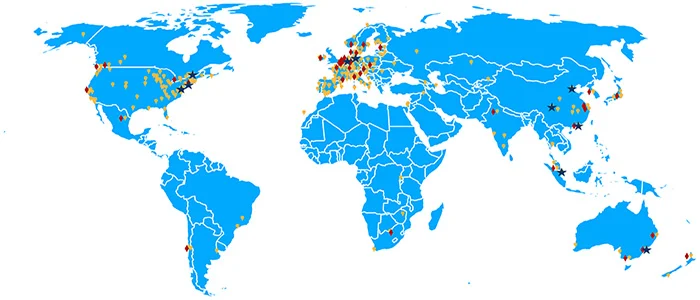Ⅰ. Introduction to ASEAN-China Young Leaders Scholarship
The ASEAN-China Young Leaders Scholarship Program (ACYLS) is an initiative in response to the call of the Leaders of the People’s Republic of China (PRC) and ASEAN Member States (AMS) to increase people-to-people exchanges, strengthen educational cooperation and promote academic exchanges and linkages between AMS and the PRC, in an effort to foster a third pillar of socio-cultural and people-to-people exchanges within ASEAN-China relationship towards building a closer community of shared future.
ACYLS is a dedicated project for ASEAN nationals, in particular young and promising professionals with working experience in ASEAN Member States. The Chinese government will provide funding for ACYLS mainly through the ASEAN-China Cooperation Fund (ACCF).
ACYLS will support nationals from AMS to study for Master or PhD degrees, undertake short-term research programs, and participate in training courses in the PRC. ACYLS provides a full scholarship award covering all program-related expenses including tuition waiver and other school fees, accommodation, round-trip international air fare, comprehensive medical insurance and stipends.
Ⅱ. ACYLS Application Guidelines
- Supporting Categories, Length of Scholarship and Instruction Language
Supporting categories: ACYLS supports young and promising professionals with working experience from ASEAN Member States to pursue Master or PhD degrees, undertake short-term research programs, and participate in training courses in the PRC.
Length of Scholarship: Recipients of ACYLS will be sponsored by the scholarship for a certain duration according to their enrolled length of schooling. The recipients shall complete their studies within the duration of scholarship. The length of schooling for each supporting category is as follows:
| <span “=”” style=”font-size: 12pt; line-height: 17.1200008392334px;”>Supporting Category | <span “=”” style=”font-size: 12pt; line-height: 17.1200008392334px;”>Length of Schooling | <span “=”” style=”font-size: 12pt; line-height: 17.1200008392334px;”>Length of Scholarship |
| <span “=”” style=”font-size: 12pt; line-height: 17.1200008392334px;”>Masters Students | <span “=”” style=”font-size: 12pt; line-height: 17.1200008392334px;”>2-3 academic years | <span “=”” style=”font-size: 12pt; line-height: 17.1200008392334px;”>2-3 academic years |
| <span “=”” style=”font-size: 12pt; line-height: 17.1200008392334px;”>Doctoral Students | <span “=”” style=”font-size: 12pt; line-height: 17.1200008392334px;”>3-4 academic years | <span “=”” style=”font-size: 12pt; line-height: 17.1200008392334px;”>3-4 academic years |
| <span “=”” style=”font-size: 12pt; line-height: 17.1200008392334px;”>Research Scholars | <span “=”” style=”font-size: 12pt; line-height: 17.1200008392334px;”>4-5 months | <span “=”” style=”font-size: 12pt; line-height: 17.1200008392334px;”>4-5 months |
Instruction Language: English. Candidates are strongly advised to register for English-taught programs, and their English language proficiency must meet the language requirements of the applied programs.
- Coverage and Standard
Stipend: Within the scholarship duration, registered scholarship students will receive a stipend from their host university on a monthly basis. Students registering on or before the 15th of the month will receive a full stipend of that month. Those who register after the 15th of the month will receive a half stipend of that month. Graduating students will receive stipend for another half a month following the graduation date. If a registered student stays out of China for more than 15 days due to personal reasons (school holidays excluded), his/her stipend will be stopped during his/her absence from China.
Masters students: 4,000 RMB per month
Doctoral students: 5,000 RMB per month
Research scholar: 5,000 RMB per month
One-time Settlement Fee: ACYLS recipients will receive the one-time settlement fee from the host university upon their registration. It is provided to masters students, doctoral students and research scholars. The standard is 3,000 RMB per person and will be issued in Chinese currency.
International Round-trip Air Fare: The fund will be used by the China Scholarship Council and the host universities to support round trip air fares (Economy Class only) of ACYLS recipients between their home country and the city of host university. Details for the use of the fund and reimbursement of flight tickets are spelled out in Chapter VI of this document.
Tuition: Tuition will be entirely covered by the ACYLS program and funds will be directly allocated to the host universities.
Accommodation: ACYLS recipients will be provided with university dormitory with one single room for each recipient.
Medical Insurance: It is covered by the ACYLS program. To check insurance policy and insurance claims, please visit http://www.csc.edu.cn/studyinchina or http://www.campuschina.org and refer to Comprehensive Insurance & Protection Scheme for Foreigners Staying in China.
- where & When to Apply
Applicants shall submit their applications to ACYLS national focal points of their respective home countries before the deadline. Faculty and staff from ASEAN universities, who apply through ASEAN University Network (AUN) and AUN Thematic Networks, shall submit their applications to AUN Secretariat before the deadline. The application generally opens from January to April every year. For the application deadline of the current year, applicants shall consult the ACYLS national focal points or AUN Secretariat directly.
- Eligibility
Applicants of ACYLS should meet the following criteria:
- Citizen of an ASEAN Member State (Brunei Darussalam, Cambodia, Indonesia, Lao PDR, Malaysia, Myanmar, Philippines, Singapore, Thailand and Viet Nam);
- In sound physical and mental health;
- Proficient in English (i.e., must possess an IELTS score of at least 6.0 or a TOEFL score of at least 80 points);
- Holder of an undergraduate degree and under the age of 45 if applying for a masters degree;
- Holder of a graduate/masters degree and under the age of 45 if applying for a PhD degree;
- Holder of at least an undergraduate degree if applying for the short-term research program;
- Having at least one-year work experience within government agencies, public or private institutions, universities, think-tanks or similar social agencies, and preferably has experience in the following:
- work related to foreign and international affairs, especially ASEAN and China-ASEAN affairs;
- work or study in the PRC;
- academic work on China or ASEAN-related affairs;
- Not a concurrent awardee of a Chinese government scholarship;
- Meets other admission requirements of the Chinese universities to which the applicant has applied.
- Application Procedures
Step 1- Complete online application by visiting CGSIS (Chinese Government Scholarship Information System) (Visit http://www.csc.edu.cn/studyinchina or http://www.campuschina.org and click Scholarship Application for Students to log in). Online submission of the application is compulsory for each applicant by completing the application information and uploading all necessary supporting documents.
Step 2- Prepare the application documents according to the List of Application Documents and upload all the required documents into the online application system. Also submit the hard copies of application form and relevant documents to the ACYLS national focal points/AUN Secretariat as required before the deadline. ACYLS national focal points of ASEAN Member States and AUN Secretariat will then review the qualifications of all applicants and provide the list of recommended recipients to the Joint Committee of the ACYLS, which will decide the final recommendation list.
Step 3- The Chinese Scholarship Council (CSC) will only process the applications recommended by the Joint Committee. Applicants not included in the list will not be considered. CSC reserves the right to make necessary adjustments to the applicants host universities.
- Application Documents
Applicants must provide authentic and valid documents according to the requests and upload clear scanned copies onto CGSIS. Failure to fulfill the requirements will negatively influence the scholarship results.
When submitting applications to the ACYLS national focal points and AUN Secretariat, the applicants should follow the prescribed requirements.
- Placement
The ACYLS will be carried out within 22 designated Chinese universities (List of the universities attached hereto). Each applicant can choose one major and three preferred universities out of the 22 designated universities. CSC will place each applicant in one university based on their choices and universities requirements. CSC will make due adjustments on the placements of those who are not selected by their preferred universities.
- Scholarship Confirmation
- Qualified applications will be sent to the candidates’ preferred universities for placement by CSC. Based on various factors, such as the scholarship funding requirements, the host university’s teaching capacity, study length and applicants criteria, CSC reserves the right to make necessary adjustments/changes to the candidate’s preferred university and field of study. The placement results will be confirmed by the universities.
- Winners of the scholarship will receive the final results from CSC through email before 31 July. The admission documents (Admission Letter and Visa Application Form for Study in China (JW201)) will be mailed to the candidates by the host universities.
- Scholarship recipients shall not change their host university, field of study, or duration of study stipulated on the Admission Letter after their coming to China.
- Scholarship will not be reserved if the scholarship recipients cannot register before the registration deadline.
Note: To ensure that the admission documents can be mailed to the recipients in a timely fashion, applicants must provide accurate, detailed and valid information for the Current Contact Information of CGSIS.
- Application for Change
Scholarship students are not allowed, in principle, to change their academic programs, host universities or the length of schooling during their study in China. Those who need to change for special reasons are required to apply to CSC via their host universities. The change can happen only after the approval from both CSC and the ACYLS Joint Committee based in Jakarta.
- Timeline
| <span “=”” style=”font-size: 12pt; line-height: 24px;”>January-April | <span “=”” style=”font-size: 12pt; line-height: 24px;”>Applicants apply to ACYLS national focal points and AUN Secretariat for the ACYLS programs and complete online application via the CGSIS(Chinese Government Scholarship information System). |
| <span “=”” style=”font-size: 12pt; line-height: 24px;”>April-May | <span “=”” style=”font-size: 12pt; line-height: 24px;”>ACYLS national focal points <span “=”” style=”font-size: 12pt; line-height: 24px;”>of AMS and AUN Secretariat review and select proper candidates, and submit the recommendation list to the Joint Committee based in Jakarta. The Joint Committee reviews all the recommendations from AMS and and AUN Secretariat, then submits a nomination list to CSC.<span “=”” style=”font-size: 12pt; line-height: 24px;”> |
| <span “=”” style=”font-size: 12pt; line-height: 24px;”>June-July | <span “=”” style=”font-size: 12pt; line-height: 24px;”>CSC engages with the designated universities for placement. |
| <span “=”” style=”font-size: 12pt; line-height: 24px;”>End of July | <span “=”” style=”font-size: 12pt; line-height: 24px;”>CSC notifies the scholarship recipients of the final results upon the confirmation<span “=”” style=”font-size: 12pt; line-height: 24px;”> by the Joint Committee<span “=”” style=”font-size: 12pt; line-height: 24px;”>. Host universities mail the admission documents to respective recipients. |
| <span “=”” style=”font-size: 12pt; line-height: 24px;”>August | <span “=”” style=”font-size: 12pt; line-height: 24px;”>ACYLS recipients receive admission documents and go through necessary procedures for coming to China. |
| <span “=”” style=”font-size: 12pt; line-height: 24px;”>September | <span “=”” style=”font-size: 12pt; line-height: 24px;”>ACYLS recipients arrive in China and register with the host universities. |
Ⅲ. Designated Universities
| <span “=”” style=”font-size: 12pt; line-height: 17.1200008392334px;”>No. | <span “=”” style=”font-size: 12pt; line-height: 17.1200008392334px;”>University | <span “=”” style=”font-size: 12pt; line-height: 17.1200008392334px;”>City | <span “=”” style=”font-size: 12pt; line-height: 17.1200008392334px;”> | <span “=”” style=”font-size: 12pt; line-height: 17.1200008392334px;”>No. | <span “=”” style=”font-size: 12pt; line-height: 17.1200008392334px;”>University | <span “=”” style=”font-size: 12pt; line-height: 17.1200008392334px;”>City |
| <span “=”” style=”font-size: 12pt; line-height: 17.1200008392334px;”>1 | <span “=”” style=”font-size: 12pt; line-height: 17.1200008392334px;”>Peking University | <span “=”” style=”font-size: 12pt; line-height: 17.1200008392334px;”>Beijing | <span “=”” style=”font-size: 12pt; line-height: 17.1200008392334px;”>12 | <span “=”” style=”font-size: 12pt; line-height: 17.1200008392334px;”>Xiamen University | <span “=”” style=”font-size: 12pt; line-height: 17.1200008392334px;”>Xiamen | |
| <span “=”” style=”font-size: 12pt; line-height: 17.1200008392334px;”>2 | <span “=”” style=”font-size: 12pt; line-height: 17.1200008392334px;”>Beihang University | <span “=”” style=”font-size: 12pt; line-height: 17.1200008392334px;”>Beijing | <span “=”” style=”font-size: 12pt; line-height: 17.1200008392334px;”>13 | <span “=”” style=”font-size: 12pt; line-height: 17.1200008392334px;”>Shanghai University of Finance and Economics | <span “=”” style=”font-size: 12pt; line-height: 17.1200008392334px;”>Shanghai | |
| <span “=”” style=”font-size: 12pt; line-height: 17.1200008392334px;”>3 | <span “=”” style=”font-size: 12pt; line-height: 17.1200008392334px;”>Beijing Institute of Technology | <span “=”” style=”font-size: 12pt; line-height: 17.1200008392334px;”>Beijing | <span “=”” style=”font-size: 12pt; line-height: 17.1200008392334px;”>14 | <span “=”” style=”font-size: 12pt; line-height: 17.1200008392334px;”>Shanghai Jiao Tong University | <span “=”” style=”font-size: 12pt; line-height: 17.1200008392334px;”>Shanghai | |
| <span “=”” style=”font-size: 12pt; line-height: 17.1200008392334px;”>4 | <span “=”” style=”font-size: 12pt; line-height: 17.1200008392334px;”>Beijing Normal University | <span “=”” style=”font-size: 12pt; line-height: 17.1200008392334px;”>Beijing | <span “=”” style=”font-size: 12pt; line-height: 17.1200008392334px;”>15 | <span “=”” style=”font-size: 12pt; line-height: 17.1200008392334px;”>Tianjin University | <span “=”” style=”font-size: 12pt; line-height: 17.1200008392334px;”>Tianjin | |
| <span “=”” style=”font-size: 12pt; line-height: 17.1200008392334px;”>5 | <span “=”” style=”font-size: 12pt; line-height: 17.1200008392334px;”>Beijing Foreign Studies University | <span “=”” style=”font-size: 12pt; line-height: 17.1200008392334px;”>Beijing | <span “=”” style=”font-size: 12pt; line-height: 17.1200008392334px;”>16 | <span “=”” style=”font-size: 12pt; line-height: 17.1200008392334px;”>Tongji University | <span “=”” style=”font-size: 12pt; line-height: 17.1200008392334px;”>Shanghai | |
| <span “=”” style=”font-size: 12pt; line-height: 17.1200008392334px;”>6 | <span “=”” style=”font-size: 12pt; line-height: 17.1200008392334px;”>Beijing Language and Culture University | <span “=”” style=”font-size: 12pt; line-height: 17.1200008392334px;”>Beijing | <span “=”” style=”font-size: 12pt; line-height: 17.1200008392334px;”>17 | <span “=”” style=”font-size: 12pt; line-height: 17.1200008392334px;”>China Foreign Affairs University | <span “=”” style=”font-size: 12pt; line-height: 17.1200008392334px;”>Beijing | |
| <span “=”” style=”font-size: 12pt; line-height: 17.1200008392334px;”>7 | <span “=”” style=”font-size: 12pt; line-height: 17.1200008392334px;”>University of International Business and Economics | <span “=”” style=”font-size: 12pt; line-height: 17.1200008392334px;”>Beijing | <span “=”” style=”font-size: 12pt; line-height: 17.1200008392334px;”>18 | <span “=”” style=”font-size: 12pt; line-height: 17.1200008392334px;”>Wuhan University | <span “=”” style=”font-size: 12pt; line-height: 17.1200008392334px;”>Wuhan | |
| <span “=”” style=”font-size: 12pt; line-height: 17.1200008392334px;”>8 | <span “=”” style=”font-size: 12pt; line-height: 17.1200008392334px;”>Fudan University | <span “=”” style=”font-size: 12pt; line-height: 17.1200008392334px;”>Shanghai | <span “=”” style=”font-size: 12pt; line-height: 17.1200008392334px;”>19 | <span “=”” style=”font-size: 12pt; line-height: 17.1200008392334px;”>Zhejiang University | <span “=”” style=”font-size: 12pt; line-height: 17.1200008392334px;”>Hangzhou | |
| <span “=”” style=”font-size: 12pt; line-height: 17.1200008392334px;”>9 | <span “=”” style=”font-size: 12pt; line-height: 17.1200008392334px;”>East China University of Science and Technology | <span “=”” style=”font-size: 12pt; line-height: 17.1200008392334px;”>Shanghai | <span “=”” style=”font-size: 12pt; line-height: 17.1200008392334px;”>20 | <span “=”” style=”font-size: 12pt; line-height: 17.1200008392334px;”>Communication University of China | <span “=”” style=”font-size: 12pt; line-height: 17.1200008392334px;”>Beijing | |
| <span “=”” style=”font-size: 12pt; line-height: 17.1200008392334px;”>10 | <span “=”” style=”font-size: 12pt; line-height: 17.1200008392334px;”>Huazhong University of Science and Technology | <span “=”” style=”font-size: 12pt; line-height: 17.1200008392334px;”>Wuhan | <span “=”” style=”font-size: 12pt; line-height: 17.1200008392334px;”>21 | <span “=”” style=”font-size: 12pt; line-height: 17.1200008392334px;”>Renmin University of China | <span “=”” style=”font-size: 12pt; line-height: 17.1200008392334px;”>Beijing | |
| <span “=”” style=”font-size: 12pt; line-height: 17.1200008392334px;”>11 | <span “=”” style=”font-size: 12pt; line-height: 17.1200008392334px;”>Tsinghua University | <span “=”” style=”font-size: 12pt; line-height: 17.1200008392334px;”>Beijing | <span “=”” style=”font-size: 12pt; line-height: 17.1200008392334px;”>22 | <span “=”” style=”font-size: 12pt; line-height: 17.1200008392334px;”>Central University of Finance and Economics | <span “=”” style=”font-size: 12pt; line-height: 17.1200008392334px;”>Beijing |
Ⅳ. List of Application Documents
- Application Form for Chinese Government Scholarship (in English);
- A copy of your valid ordinary passport home page;
- Notarized highest diploma. Documents in languages other than Chinese or English must be attached with notarized Chinese or English translations.
- Academic transcripts. Transcripts in languages other than Chinese or English must be attached with notarized Chinese or English translations.
- A Study Plan or Research Proposal (written in Chinese or English). This should be a minimum of 500 words for non-degree students, and 800 words for graduate students.
- Two Recommendation Letters (written in Chinese or English). Applicants for the graduate programs or the short-term research scholar programs must submit two recommendation letters, one from the candidate’s current employer and one from the candidate’s university professor.
- Valid documents of your legal guardians in China (only required for applicants under the age of 18).
- Certificates of English language proficiency (IELTS with minimum 6.0/TOFEL with 80 or above, or other internationally accepted certificates in the equivalent level).
- Foreigner Physical Examination Form, (written in English, only required for applicants planning to stay in China for more than 6 months, can be downloaded from http://www.csc.edu.cn/studyinchina or http://www.campuschina.org); The physical examinations must cover all of the items listed in the Foreigner Physical Examination Form. Incomplete forms or forms without the signature of the attending physician, or the official stamp of the hospital, or a sealed photograph of the applicants are considered as invalid. Please carefully plan your physical examination schedule as the result is valid for only 6 months.
- A resume or CV including the educational background and working experience after high school (Upload to Other Supporting Documents in the CGSIS).
Ⅴ. Instructions for Chinese Government Scholarship
Information System (CGSIS)
Please carefully read the instructions before applying for the scholarship.
Step 1: Visit “CSC Study in China” website and click “Scholarship Application for Students” at http://www.csc.edu.cn/studyinchina or http://www.campuschina.org
Register an account through [CREATE AN ACCOUNT] and login with your account.
Step 2: Input Personal Details. Click Edit Personal Details and finish inputting personal details by filling in all the information, verifying and saving the information. After the completion of this section, return to the previous page by clicking Finish and start filling in your application information.
Step 3: Select the correct Program Category.
Please select Program Category Type A.
Step 4: Input the correct Agency Number.
Your Agency Number is: 0025.
Program Category and Agency Number are directly matched, both are mandatory for online application. Scholarship receiving authorities (or application processing authorities) will inform the program category and agency number to candidates who are qualified for applying.
After inputting agency number, the matched agency name will automatically show on the page. As Program Category and Agency Number are directly matched, application processing authorities will not receive your online application if the program category or agency number are not correct.
Step 5: Input Application Information
Next, please move on to the section of Language Proficiency and Study Plan and upload Supporting Documents as requested, then click Submit to complete the application. Check each part of your application carefully before submission. Please make sure that all the information and uploaded documents are valid and accurate.
When applicants of Type A application choose the Preferences of Institutes, system will automatically match the available universities according to the selected Student Category, Preferred teaching language and Major Applying for. With any inquiry concerning the available majors of each university, please visit the following website.
http://www.campuschina.org/universities/index.html
Catalog of Discipline Field, First-level Discipline, Specialty is available from the Help, applicants could download the file to identify the relation between Discipline and Major.
Step 6: Once submitted, amendment cannot be made on Personal Details and Application Information. Before the application being processed by the processing authorities, applicant can revoke the submitted application by clicking Withdraw and edit the application. After revoking the application, applicant must submit at second time after re-editing, or the application will not be processed. Once the application is processed, application cannot be revoked.
Step 7: Click Print the Application Form and download the form.
Step 8: Submit scholarship application under the requirements of the dispatching authorities (or application processing agency)
http://www.csc.edu.cn/studyinchina (http://www.campuschina.org/)
Notes:
Application with incorrect Agency Number will not be processed.
Please use Firefox or Internet Explorer (11.0).
For applicants using Internet Explorer, please close the “compatible view mode” function ahead of editing.
Please fill in all application information in Chinese or English.
Ⅵ. Tips for Coming to China
- Visa Application
ACYLS winners should apply for a visa to study in China to the Chinese embassy or consulate-general with the original documents and photocopies of the Admission Letter, Visa Application for Study in China (JW201), Foreigner Physical Examination Form and valid ordinary passport. Those who will study in China for more than 6 months must apply for X1 visa, and those who will study in China for less than 6 months (including 6 months) can apply for X2 visa. Students who come to China with other types of passports, visas or without the original documents will not be able to register with the universities, nor will they be able to apply for the residence permit in China.
Visa application cost is at students own expense.
- Registration, Health Verification and Residence Permit
Registration
Scholarship students must register with the host universities before the deadline of the registration as specified in Admission Letter with the original Admission Letter, Visa Application for Study in China (JW201) and Foreigner Physical Examination Form. Those who are unable to register on time must get permission from the host institution directly. Those who fail to register without the prior consent of the institution will be considered as voluntarily giving up the scholarship and the scholarship will be automatically terminated.
Health Verification and Residence Permit
Health Verification: Scholarship students who are to stay in China for more than 6 months are requested to submit the original documents of their passport, Admission Letter, Foreigner Physical Examination Form and Blood Test Report to the local health quarantine office to have their physical examination report verified. Scholarship students who do not meet the requirements of the above authority will be required to re-take the physical examination. Those who refuse to re-take the physical examination or are diagnosed with diseases that are not permitted to stay in China according to Chinese laws and regulations will be required to leave China.
Residence Permit: Upon their arrival in China, scholarship students must apply for residence permit to the local police authority before the deadline regulated by the visa-issuing authority with their passport, Admission Letter, Visa Application Form for Study in China (JW201), verified health report, and photograph that meets the image requirements of the authority.
- Funding of International Round-trip Air Fare
For masters and doctoral degree students, ACYLS will provide them with international round-trip air fare for their first visit to China and return to home country after graduation, as well as one international round-trip air fare for home visit each academic year. Students need to purchase the air tickets (economy class only) by themselves according to relevant regulations, and apply for reimbursement of the expenses from the host university with the original purchase receipt.
For the first visit to China and return to home country upon graduation, the ceiling for reimbursement is 3000 RMB each. The ceiling for round-trip ticket for home visit is 6000 RMB. The excess fee shall be borne by the students.
For the first visit ticket to China, students can apply for reimbursement after their registration with the university. For the return ticket to home country upon graduation, the students can apply for reimbursement when they are qualified for graduation. For home visit round-trip ticket every academic year, students can apply for reimbursement after their return to school from home visit.
For Research Scholars, ACYLS will provide them with one-time international round-trip air fare. Students need to purchase the air tickets (economy class only) by themselves according to relevant regulations, and apply for reimbursement of the expenses from the host university with the original purchase receipt. The round-trip air ticket shall not exceed 6000 RMB. The students can apply for reimbursement prior to their completion of study.







